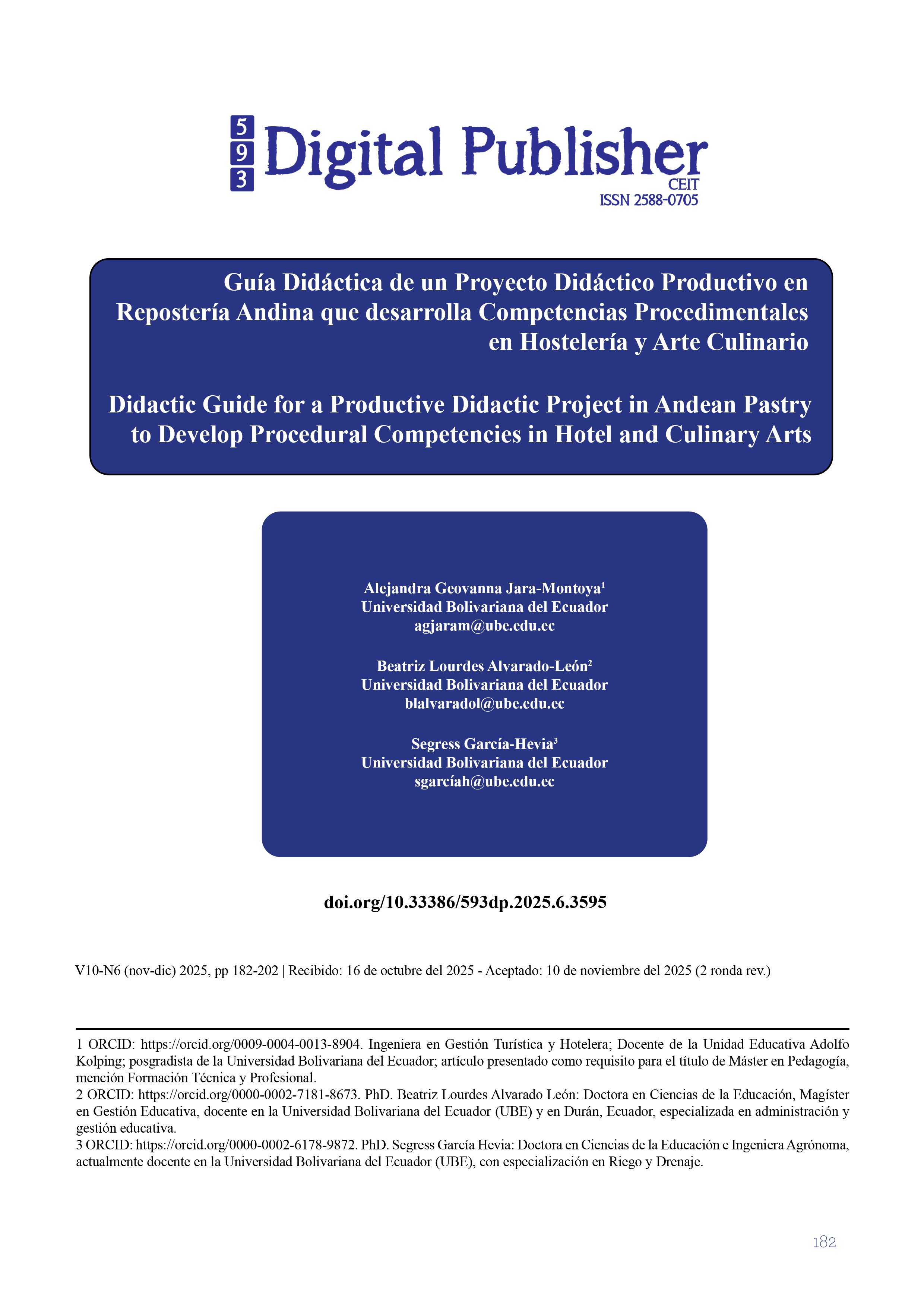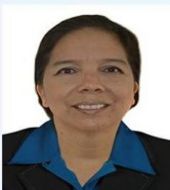Didactic Guide for a Productive Didactic Project in Andean Pastry to Develop Procedural Competencies in Hotel and Culinary Arts
Main Article Content
Abstract
The objective of this research was to design a Didactic Guide for a Productive Project in Andean Pastry, aimed at developing procedural competencies in students of the Technical Baccalaureate in Hospitality and Culinary Arts. The methodology followed a mixed-method approach. Theoretical methods (documentary analysis) and empirical methods (surveys and semi-structured interviews) were employed. The population consisted of 29 students, two teachers, and one administrator from the Adolfo Kolping Educational Unit; the sample coincided with the entire selected population. The instruments applied included a 14-question survey and a 7-item interview guide, both validated through expert judgment. The results showed that 97% of the students and 75% of teachers and administrators rated the proposal at a high level, highlighting improvements in order, cleanliness, teamwork, resource management, and customer service. No negative evaluations were recorded, and the main recommendations focused on optimizing resources and updating content. It is concluded that the guide represents a relevant pedagogical resource that integrates theory and practice, strengthens cultural identity, and enhances technical training. Furthermore, it presents high potential for replicability in other modules and educational contexts.
Downloads
Article Details

This work is licensed under a Creative Commons Attribution-NonCommercial-ShareAlike 4.0 International License.
1. Derechos de autor
Las obras que se publican en 593 Digital Publisher CEIT están sujetas a los siguientes términos:
1.1. 593 Digital Publisher CEIT, conserva los derechos patrimoniales (copyright) de las obras publicadas, favorece y permite la reutilización de las mismas bajo la licencia Licencia Creative Commons 4.0 de Reconocimiento-NoComercial-CompartirIgual 4.0, por lo cual se pueden copiar, usar, difundir, transmitir y exponer públicamente, siempre que:
1.1.a. Se cite la autoría y fuente original de su publicación (revista, editorial, URL).
1.1.b. No se usen para fines comerciales u onerosos.
1.1.c. Se mencione la existencia y especificaciones de esta licencia de uso.
References
Altieri, M. (2000). Teoría y práctica para una agroecología sustentable. México: Red de Formación Ambiental para América Latina y el Caribe.
Arteaga, R., & Figueroa, M. (2016). La guía didáctica: sugerencias para su elaboración y utilización. Instituto Superior Pedagógico “Rafael M. de Mendive”. Obtenido de https://dialnet.unirioja.es/servlet/articulo?codigo=6320438
Ayala, G. (2014). CIPOTATO. Obtenido de https://cipotato.org/wp-content/uploads/2014/09/07_Aporte_cultivos_andinos_nutric_human.pdf
Barriga Arceo, F. D., & Hernández Rojas, G. (2002). Estrategias docentes para un aprendizaje significativo: una interpretación constructivista. México: McGRAW·HILL.
Beron, G. E. (2015). Proyectos pedagógicos productivos: Estrategias para el aprendizaje escolar y los proyecto de vida. Academia. Obtenido de https://www.academia.edu/1751467/Proyectos_pedag%C3%B3gicos_productivos_Estrategias_para_el_aprendizaje_escolar_y_los_proyecto_de_vida
Bowie, D., & et al. (2016). Hospitality marketing. 2da. Routledge.
Boyatzis, R. (1982). The Competent Manager: A Model for Effective Performance.
Cabezas, M., & Loor, G. (2021). Diseño de guías didácticas para la formación técnica en gastronomía. Revista Científica Dominio de las Ciencias, 7(2), 421-439. doi:https://doi.org/10.23857/dc.v7i2.2370
Contreras, J., & Gracia, M. (2005). Alimentación y cultura: perspectivas antropológicas. 392. Barcelona.: Ariel.
Dewey, J. (1938). Experience and Education.
Facione, P. (1990). Pensamiento Crítico:¿ Qué es y por qué es importante. (Vol. 23). Milbrae: Editorial Académica de California.
FAO. (2020). El estado mundial de la agricultura y la alimentación 2020. Superar los desafíos relacionados. 236. Roma, Italia: FAO. doi:https://doi.org/10.4060/cb1447es
G.Cuarán-Casa, M.Quijije-Cedeño, Torres-Espín, E. M., & Cabezas-Mejía, E. D. (2022). Implementación guía didáctica informatizada para el proceso de enseñanza aprendizaje de la contabilidad. Revista de Investigación Sigma, 9(1), 30-40. doi:https://doi.org/10.24133/sigma.v9i01.2623
González, R., & Ríos, C. (2019). Uso de guías didácticas en programas de formación gastronómica. Revista de Estudios en Educación Técnica, 5(1), 55-68.
Haro Barreno, L. (2016). Propuesta de repostería elaborada a base de productos agrícolas andínos. Elaboración de un restaurante que implementa la colorimetría en sus panes, ubicado al norte de Quito (Tesis de pregrado). Quito: Universidad de las Amérocas. Obtenido de http://dspace.udla.edu.ec/handle/33000/5737
Hernández-Sampieri, R. &. (2020). Metodología de la investigación: las rutas cuantitativa, cualitativa y mixta.
ISO . (2015). ISO 9001.
Jara, O. (2018). La sistematización de experiencias. Bogotá: CINDE.
Kolb, D. (1984). Experiential Learning: Experience as the source of learning and development (Vol. 1). Journal of Business Ethics.
Kotler, P., & et al. (2017). Marketing for hospitality and tourism. 7ma. Pearson.
Labensky, S. R., & et al. (2018). On cooking: A textbook of culinary fundamentals. 6ta. Pearson.
Loayza Merizalde, G. L. (2017). PROPUESTA DE FACTIBILIDAD PARA LA CREACIÓN DE UNA REPOSTERÍA EN EL CANTÓN MACHALA PROVINCIA DE EL ORO 2016. Tesis de Pregrado. Riobamba: Escuela Superior Politécnica de Chimborazo. Obtenido de https://dspace.espoch.edu.ec:8080/server/api/core/bitstreams/af520c4b-bc46-412e-8cde-924a11c08b4b/content
López-Gómez, J. (2017). Desarrollo de competencias procedimentales en la educación técnica: un enfoque por proyectos . . Tesis de maestría, Universidad de Granada. Granada: Repositorio Institucional UGR.
Mejía, L. G. (2013). La guía didáctica: práctica de base en el proceso de enseñanza-aprendizaje y en la gestión del conocimiento. Apertura, 5(1), 66-73. Obtenido de https://www.redalyc.org/articulo.oa?id=68830443006
Ministerio de Educación . (2024). Ministerio de Educación. Obtenido de https://educacion.gob.ec/ministerio-de-educacion-fortalece-el-curriculo-en-todos-los-niveles-educativos/
Ministerio de Educación. (2021). REGLAMENTO LEY ORGÁNICA DE EDUCACIÓN INTERCULTURAL.
OMS (Organización Mundial de la Salud). (2021). Seguridad alimentaria, nutrición y las pautas dietéticas globales. OMS.
ONU. (2015). Agenda 2030 para el Desarrollo Sostenible.
Organización Mundial de Turismo (OMT). (2019). Informe global sobre turismo gastronómico. Madrid: OMT.
ORGANIZACIÓN MUNDIAL DE TURISMO (OMT). (2022). ONU Turismo. Obtenido de https://www.unwto.org/es/omt-2022-resumen-ano#:~:text=La%20OMT%20defendi%C3%B3%20el%20papel,m%C3%A1s%20relevante%2C%20ni%20m%C3%A1s%20necesario.
Porter, M. E. (2008). The five competitive forces that shape strategy. 86, 1, 78-93. Harvard Business Review.
Quezada Chía, K. F., & Rumbaut Rangel, D. (2024). Proyecto didáctico productivo como metodología emergente para la enseñanza del módulo detributación en contabilidad. 6(3), 246-262. doi:https://doi.org/10.47606/ACVEN/PH0277
Rodríguez, M., & Pérez, S. (2019). Gestión estratégica y la implementación de proyectos. Editorial Académica Española.
Satán Ebla, C. E. (2019). Creación de un recetario con el uso de flores comestibles pertenecientes a la clasificación de tubérculos y árboles frutales. Bachelor’s thesis. Quito: Universidad de las Américas.
Silva Zamora, A., & al., e. (2022). Gastronomía sustentable en restaurantes y eventos turísticos de México en el contexto internacional. México: El Periplo Sustentable. Obtenido de file:///D:/USUARIOS/Downloads/Dialnet-GastronomiaSustentableEnRestaurantesYEventosTurist-9707008.pdf
Spencer, L., & Spencer, S. (1993). Competence at Work: Models for Superior Performance.
Tobón, S. (2013). Formación integral y competencias: pensamiento complejo, currículo, didáctica y evaluación (4ta ed.). Bogota: ECOE Ediciones.
Tóbon, S. (2017). Evaluación socioformativa. Estrategias e instrumentos. Mount Dora (USA): Kresearch.
Toledo, V. M., & Barrera Bassols, N. (2009). La memoria biocultural: la importancia de las sabidurías tradicionales. 96, 096. Ciencias. Obtenido de https://www.revistas.unam.mx/index.php/cns/article/view/17958
Universidad Bolivariana del Ecuador. (2024). Estructura del Proyecto Didáctico Productivo. Studocu. Obtenido de https://www.studocu.com/ec/document/universidad-bolivariana-del-ecuador/didactica-de-la-educacion/estructura-del-proyecto-didactivo-productivo/104262216
Vygotsky, L. (1978). La mente en la sociedad: el desarrollo de los procesos psicológicos superiores. Londres: Harvard University Press.
Yépez, M., & Chicaiza, P. (2021). Competencias procedimentales en la formación técnica gastronómica. Revista Científica Dominio de las Ciencias, 7(4), 1233-1240. doi:https://doi.org/10.23857/dc.v7i4
Zabala, A., & Arnau, L. (2014). Metodología de enseñanza basada en competencias. Gráo.
Zárate Bujanda, J. L., Corbacho Carpio, J., & Leva Huamán, M. (2024). Hospitalidad Andina: Integrando Tradiciones Culinarias en la Experiencia Hotelera de Cusco. Estudios Y Perspectivas Revista Científica Y Académica, 4(2), 871-882. doi:https://doi.org/10.61384/r.c.a..v4i2.264




